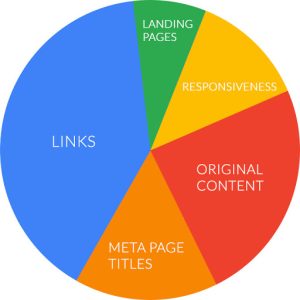The Major Factors Google Uses To Rank: With the advent of technology, there are pools of businesses moving online. Surely, it gives a much better platform & scope for the larger market.
But how can you reach your target audience? Is making a good website sufficient? How hard is the competition?

Let’s know More About The Major Factors Google Uses To Rank :
Making a good website is very important, but it’s not sufficient. You have to get your website ranking high. It’s very similar to your offline business, for example, a neat & clean well-organized shop will leave a great impression on customers but how to attract them well without marketing its Nearly Impossible, So similarly its nigh impossible to attract traffic without SEO. If you have a WordPress website you can check out WordPress SEO Tricks to rank your website.
So What Is SEO?
SEO is Search Engine Optimisation. If we are to quote Wikipedia “Search engine optimization is the process of increasing the visibility of a website or a web page to users of a web search engine. The term excludes the purchase of paid placement, referring only to the improvement of unpaid results”
In simple terms, SEO is a process to improve your website ranking on any search engine without spending any money on paid advertisements. Here we are going to talk about SEO for Google as it is used by the majority of your target audience.
So our next question is how Google determines which website to rank & which site to suppress. Well, the exact formula is very complicated & to run on that will not exactly be feasible.
Google has Roughly 200 different parameters to determine the ranking of a website. Which makes it really difficult to get the exact process to reach the top.
Well if you are going to try all 200 it is going to be tough or impossible to get better results. The best option is to follow 3-4 parameters that cover the essence of SEO.
But what are these factors? Well, there is no single answer to this question but if we go with the most popular approaches well you can say the most important factors.

Content
Yes, the saying about Content is King still holds much value in SEO. What is SEO without content? Content is the soul of SEO. But why is that so? Well, Google is always looking for new content & if you have unique content with a really good way of presenting it you are going to get noticed.
Content indeed is The Major Factors Google Uses To Rank. Three are three basic parameters of On-page SEO.Google always tries to give you the best experience possible by directing you to the greatest content it can find. This means that your number one job to do well with SEO is to produce great content. SEO content writing is the most important factor in google ranking.
Here Are Some Factors To Consider While Creating Content.
- Keyword Selection & Placement
- The thoroughness of Your Content
- Quality of Your Content
- Presentation – Insert as many as Images, infographics, questions, etc to make eye-catchy content.
- The uniqueness of your Content – It should be 100% unique
- Use Easy to understand the language
- Use Headings to cover different topics
- Create Title & Meta Description with utmost care. They are the first Impression for user & for Google, it should contain relevant keywords & should contain enough info so that user gets what your content is about.
they areThe Major Factors Google Uses To Rank

Secure Website :
It is one of the most important factors when you have created amazing content your user should feel safe to browse to your website. Positive SSL has become very important and sites without safe browsing are becoming history now.
Other good practices for a secure website are the presence of robots.txt file, sitemap, clean coded & there should not be any spammy links on your website.
Website Loading Speed
Page speed is another important factor for SEO ranking factors for years. Google wants to improve users’ experience of the web, and fast-loading web pages will definitely do that. Google has already announced in its update in July 2018 that If your site doesn’t load fast on mobile devices, then it could be penalized.
There are various tools to check Page Speed the best two tools I will recommend are :
GT Metrix
Google Page Speed Insight
Mobile Friendly
Google uses mobile-first index policy, which means it ranks mobile-optimized sites first, rather than sites geared to desktop computers. If your site isn’t mobile-optimized you risk being out in the cold, in SEO terms at least.
There are many factors to decide whether a website is mobile-friendly or not. We are going to do a detailed article on Mobile-Friendly websites. For now, let’s look at the mobile-friendly factors in brief.
- Whether your website is responsive or not
- Whether you’re using large fonts for easy readability on a small screen
- Accessibility and navigability, including making it easy to tap menus
- Ensuring that essential content isn’t hidden by interstitial ads
- Whether your site load speed for Mobile is optimum or not
- Whether Your site is AMP Validated or not. AMP is another huge factor for Google to decide which page to rank first. AMP ( Accelerated mobile pages ) are pages with minimum CSS for, especially mobile or slow networks.
Domain Age and Authority
Well, a detailed study completed by Baccklinko states that domain age is one of the facts that is responsible for Google Ranking. But this doesn’t hold 100 percent true. Well, the domain with high Authority is preferred by Google rather than an old domain. Although with time your domain authority increases. But age is not the only factor that decides DA. Age, number of backlinks, spam score, Quality of the backlinks are the factors deciding Domain Authority.
Domain Name is also a great factor. If you have a domain with your preferred keyword in it then you are at a great advantage. Google has penalized exact-match domains (those where the target keyword is in the URL), that penalty is generally for spammy sites with thin content.
Other research shows that exact-match domains that are deemed to be relevant, valuable, and high-quality can see a ranking boost because of it. However, if you already have an established website, you don’t need to go looking for an exact-match domain for your business; focus on a URL that reflects your business and optimize the heck out of it instead!
When it comes to search engine ranking factors, authority matters. As you’ll see, that’s usually a combination of great content (see the next tip) and off-page SEO signals like inbound links and social shares.
Page Structure
We said earlier that getting the code right is one aspect of optimizing content for better search engine rankings. Here are some of the aspects you need to look at
- Proper use of header tags to show content hierarchy. If your title is formatted as h1, then use h2 or h3 for subheads.
- Usage of your focus keyword in Heading Tag is a must.
- Don’t add more than one H1 Tag. Use the proper hierarchy.
- Use Meta tags. Optimized Meta tags work magic
- Don’t cross the word limit
- Use Alt Tags in Images
- Where it’s appropriate, use schema markup to tell Google what kind of content you’re producing
Links
As we said at the start, the web is built on links, so naturally, links are a crucial SEO ranking signal. There are three kinds of links to think about:
- Inbound links
- Outbound links
- Internal links
Google uses inbound links as one way to help determine how authoritative and relevant your content is.
linking to your own content can help tie pages together for both Google and your visitors, making each page more valuable. If you have an authoritative page and link to another page on your site, that helps visitors find the other page and passes on some of that authority. That will help that second page boost its search engine ranking.
Social Signals
When people share your content on social networks, that’s another sign that it’s valuable. Cognitive SEO‘s study of 23 million shares found a definitive link between social shares and search engine ranking.
These are the factors that affect your website’s search engine ranking. Stay Tuned for more on SEO on our technical blog tecnomerger
Learn more about the technical aspects of creating digital properties in our upcoming Content Management Systems blog series.

